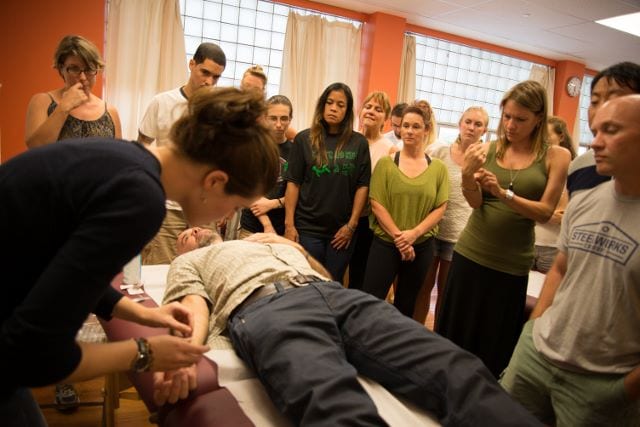NCCAOM® and the NCCAOM® Academy of Diplomates Dry Needling Position
What is Dry Needling?
“Dry needling” is acupuncture. Acupuncture is the insertion of thin solid needles into anatomical locations to treat disease, injury, pain, or dysfunction, and to promote health and wellness. “Dry needling” is a recently coined name for an acupuncture technique that involves the insertion of acupuncture needles directly into muscles and “trigger points” for the relief of musculoskeletal pain.
Licensed acupuncturists have practiced and documented this acupuncture technique, now referred to as “dry needling”, for decades in the US.
What is the difference between acupuncture and dry needling?
Some physical therapists and other healthcare providers have claimed that “dry needling” is “new” and “not acupuncture”, because the point locations and needling style are based on anatomical structures and physiological function rather than on traditional Chinese medicine acupuncture theory. In fact, licensed acupuncturists receive training in the application of both traditional foundations of acupuncture and modern biomedical theories, and have done so since long before the term “dry needling” was invented.
Who can perform dry needling?
“Dry needling” is an advanced and invasive procedure. In the hands of a practitioner who has received limited and/or substandard training, it has the potential to cause great harm. It can be considered safe only when performed by properly trained and experienced acupuncturists.
NCCAOM National Board Certified Acupuncturists receive hundreds of hours in the core skills required to correctly perform invasive and potentially dangerous needling techniques, assuring their competencies to insert and manipulate acupuncture needles safely.
How do you become certified in dry needling?
Is there a required accredited academic program for the training of physical therapists to practice dry needling acupuncture?
There is no national standard entry-level academic curriculum that offers training or education in any form of needling for physical therapists. The only training in dry needling acupuncture for physical therapists are abbreviated continuing education workshops. There are no minimum hours or curriculum standards for these workshops.
Is there a valid and reliable examination to test competency of physical therapists in the practice of dry needling acupuncture?
No. There are no national psychometrically validated examinations to test competency of physical therapists in the practice of dry needling acupuncture.
What academic and clinical practice training are required for licensed acupuncturists to practice dry needling acupuncture?
Licensed acupuncturists receive years of academic education and training in many acupuncture techniques, including what is now termed “dry needling”. Nearly all states require licensed acupuncturists to meet NCCAOM standards of eligibility and pass national board certification exams.
What are the specific requirements for NCCAOM Nationally Board-Certified Acupuncturists?
To become an NCCAOM Nationally Board-Certified AcupuncturistTM, applicants must, at a minimum:
- Complete a minimum of three years or 1,905 hours of postgraduate education, including a minimum of 660 hours of supervised clinical training.
- Graduate with a Masters degree or Professional Doctorate degree in Acupuncture or Oriental Medicine that is accredited by the Accreditation Commission for Acupuncture and Oriental Medicine (ACAOM). ACAOM is the only accreditation agency recognized for this purpose by the United States Department of Education.
- Successfully pass three psychometrically validated NCCAOM National Board Examinations:
o Foundations of Oriental Medicine
o Acupuncture with Point Location
o Biomedicine - Document completion of an NCCAOM approved course and assessment in Clean Needle Technique.
- Sign and be held accountable to the NCCAOM® Code of Ethics and Grounds for Professional Discipline. Failure to comply is subject to disciplinary action.
NCCAOM National Board Certification and/or a passing score on the NCCAOM certification examinations are required for acupuncturist licensure in 46 states plus the District of Columbia.
What is the NCCAOM?
The National Certification Commission for Acupuncture and Oriental Medicine (NCCAOM) is the only
nationally accredited certification organization that assures entry-level competency of acupuncturists.
The NCCAOM’s credentialing program in Acupuncture is accredited by a third-party accrediting body,
National Commission for Certification Agencies (NCCA).
The NCCAOM’s mission is to assure the safety and well-being of the public and to advance the
professional practice of acupuncture and Oriental medicine by establishing and promoting
national evidence-based standards of competence and credentialing.
NCCAOM’s top priority is to protect the public from the unsafe practice of acupuncture and Oriental
medicine by individuals who do not have appropriate training and meet competency standards.
What are the position statements of other professional organizations regarding the practice of
“dry needling”?
Please follow these links:
American Academy of Medical Acupuncture Position Statement
American Academy of Physical Medicine and Rehabilitation Position Statement
American Alliance for Professional Acupuncture Safety White Paper
American Association of Acupuncture and Oriental Medicine Position Statement
American Medical Association Position Statement
American Society of Acupuncturists Position Statement
American Traditional Chinese Medical Association Paper on Dry Needling
Council of Colleges of Acupuncture and Oriental Medicine Position Paper
